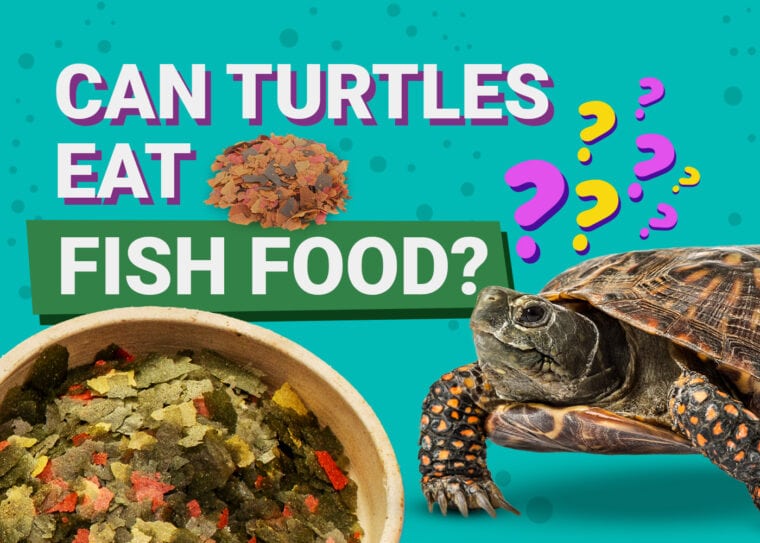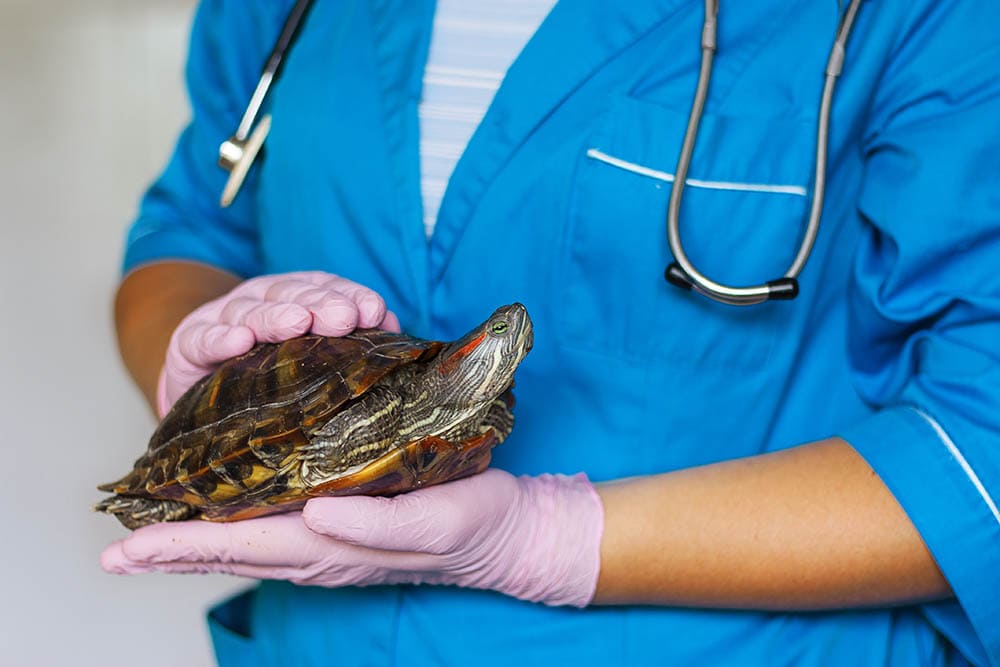
Turtles eat a variety of food. That being said, many factors play a role in determining their nutritional needs. Since turtles are not common pets, it may be difficult to find reliable information or species-appropriate food for your pet at times. Fish food is relatively inexpensive and available in nearly every pet store, leading to some turtle owners using this as food for their turtles.
Fish food is safe for most aquatic turtles to eat, but it should not be part of their main diet. Fish food is not toxic to turtles and you do not have to fear if your turtle does end up eating a few bites worth.
Is Fish Food Safe for Turtles?
In this article, we will focus on the nutritional compatibility of a popular freshwater turtle, the red-eared slider (Trachemys scripta elegans). This information might not be applicable to other species of turtle. Iit is best to consult your exotic or reptile veterinarian for more information about your pet’s nutritional needs.
Yes! Fish food in general is safe for red-eared sliders. However, even if it is not harmful to them to eat, it is not considered “good” for them. This is because turtles have different dietary requirements to fish. Most brands of fish food are considered safe for turtles and there are very few ingredients that could cause harm. The ingredients used in many fish foods are also used in commercial turtle food; however, the formulations tend to vary.
Fish food does not fulfill a turtle’s nutritional requirements; therefore, it is not sustainable as a sole diet because it does not provide your turtle with the right amount of nutrients they need for proper growth, development, and maintenance.

How Often Can You Feed Fish Food to Turtles?
If you do plan to feed your turtle fish food as a treat, or if you are worried that your turtle is eating too much of the food that you have fed to your fish then it is best to keep it at a minimum. You do not want to feed your turtle too much fish food as it can mess with their natural diet.
It is okay if your turtle eats a few morsels of fish food every week. However, nutritional analysis of the diet of healthy pet turtles reveals a very low portion of pellets in their diet (around 5%) 1.
If you want to feed certain fish foods as a treat for your turtle, they should get a few pellets or flakes once a week. If you want to keep it safe, then you can feed them fish food every second week. Make sure that it does not mess with their diet as feeding them too much fish food can cause them to not want to eat much of their diet.
Types of Fish Foods Safe for Turtles
Ensuring that the fish food you want to feed your turtle is safe for them is important. There are very few fish foods recommended for turtles, but here is a list of foods that are not harmful to turtles:

Turtle Nutrition Info
Red-eared sliders are omnivores and thrive on a diet of both meat-based and plant matter. Animal-based foods can include commercial turtle pellets, sardines, shrimp, and worms.
They also enjoy eating live prey like krill, crickets, moths, and feeder fish (these are best offered frozen and thawed). A typical pet turtles’ animal-based diet should be a mixture of turtle pellets, live foods, and freeze-dried foods.
Though these turtles are mostly carnivorous when young, they tend to slowly incorporate more greens into their diet once they are adults, and the portion of animal-based foods decreases accordingly.
Some good commercial turtle foods as a starting point are:
However, please keep in mind that your pet’s nutritional needs are influenced by a number of factors beyond their age. It is strongly recommended to consult a veterinarian for more information about their dietary needs.
Making Food for Your Turtle
There may be a situation in which you cannot find a satisfactory pellet for your pet and be frustrated with the choices available to you. An acceptable gel food for omnivorous (and carnivorous) pet turtles can be formulated with the following recipe.
| Ingredient | Amount Needed |
| Water | 270 g (approximately 30 fl. oz.) |
| Gelatin | 34 g (1.2 oz.) |
| Corn oil | 11 g (0.4 oz.) |
| Spinach | 23 g (0.8 oz.) |
| Cooked sweet potato | 23 g (0.8 oz.) |
| Trout pellets | 50 g (1.76 oz.) |
| Turtle vitamin and mineral supplement | 6 g (0.2 oz.) |
Source: MSD Veterinary Manual
The recipe is fairly straightforward and involves mixing all these ingredients until you get a fine, gel-like consistency. The nutritional yield of this recipe is as follows:
Conclusion
Now you know that fish food can be safe for turtles! Although, not as an only diet. Your turtle can remain healthy eating small portions of fish food infrequently along with a healthy diet formulated specially for them.
Ultimately, though not toxic, fish food isn’t considered mandatory for your pet turtle’s health. Your pet won’t be missing out if you opt out of purchasing fish food for them.
Looking for more advice on what turtles can eat? Check out:









